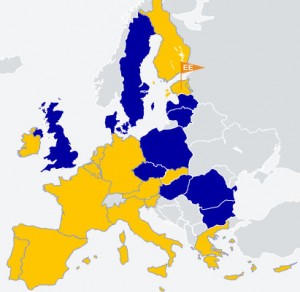The crisis in the euro area is long and painful, and progress towards its resolution is not proceeding in a linear way. The problem by now has been well-diagnosed. The euro was put in place without the proper institutions to support it. A monetary union needs a fiscal union pillar, a financial stability pillar and a competitiveness pillar.

The launching of monetary union was done on the premise that the constraints in the Fiscal Stability Pact on limits to public deficits and debts coupled with a no-bailout clause for countries in trouble would be enough to generate a virtuous circle in which governments would behave responsibly in fiscal matters and social agents would understand the implications of belonging to a monetary union with the impossibility to devalue to regain competitiveness.
This required deep reforms in the participating countries which would make their economies more flexible and capable of weathering shocks and control imbalances. The convergence of the risk premia that investors required to hold sovereign debt of different member countries, as diverse as Greece and Germany for example, diminished and almost disappeared. At the same time, credit conditions in the eurozone where very lax and favorable for a long period.
Unfortunately, the virtuous cycle turned out to be spurious. Some countries, like Germany, did do the homework and reformed to gain competitiveness but others did not. Indeed, some countries like Spain or Ireland profited from the extraordinary credit conditions, and too lax monetary policy from their perspective, to inflate enormous real estate bubbles instead of investing in human and technological capital to strengthen their competitiveness and reform their economies. The accumulation of private external debt proved to be the Achilles heel of those economies when capitals inflows dried out because of the crisis. Other countries, like Greece, behaved in an irresponsible way fiscally.

The eurozone is now in the process of building the necessary institutions for stability. Chief among them is a banking union, understood as a centralized bank supervisor – the ECB – a common resolution authority for banks in trouble, and a common deposit insurance fund, as well as a unified rule book for prudential supervision. However, both the resolution authority and the deposit insurance fund need a fiscal backstop that implies a degree of fiscal union from which we are far away.
A contentious issue is who should assume the burden of cleaning the legacy assets of banks in trouble when the sovereign of the bank is weak. The well-known problem is that bank and sovereign weaknesses reinforce each other. The historical U.S. experience can be of some use here. Hamilton argued successfully against Madison and Jefferson that the independence war debt accumulated by the states should be assumed by the new federation. This was made possible in 1790 because the Union established its own taxes (a tariff in fact) and raised its own revenues, and because there was an elected president, George Washington, who was inaugurated in 1789.
In the middle of the XIX century when some states defaulted the debts were not assumed by the federation, no bailout was provided, and instead at the end of the century many state debt restraints or balance budget laws had been put in place. The U.S. did not establish a central bank until 1914, with 12 regional banks that do not correspond to the states, and only after 1933 it became more centralized. The U.S. example provides some ideas on possible developments for Europe but it clearly shows also that progress in building federal institutions is not a linear process and it requires a large amount of political will.
*Prof. Xavier Vives of IESE’s Department of Economics has been recently awarded the “Jaime I de Economia” prize. Prof. Vives was chosen for his work in the field of organizational industrial theory, finance and regulation, particularly in the area of banking integration.


Federico Ferraro you are absolutely right its need and make sense of advance Europe.
My question is: Why the authorities did not do build this institutions years ago? I remember some economists at the beginning of 2000’s talking about the need of having a unique authority in banking and in other fields, to advance in the union of Europe.